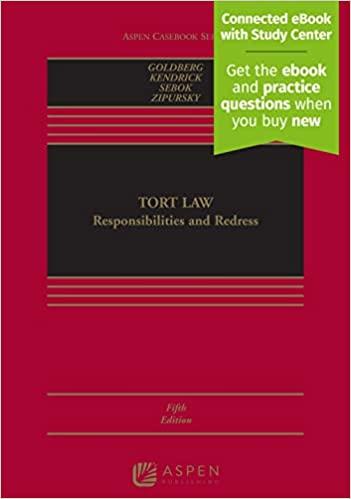Question
1. A negotiation will most likely lead to agreement when the parties are: Select one: a. Equal in power b. Aggressive c. Uncommunicative Incorrect d.
1. A negotiation will most likely lead to agreement when the parties are:
Select one:
a. Equal in power
b. Aggressive
c. Uncommunicative
Incorrect
d. Coercive
e. Vulnerable
2. Fred sold Carole his old Macintosh computer and his printer in addition to eight programs for $2900. After she paid $1000,
Carole quit paying. When she had no complaint about the computer, printer, or programs but simply wouldn't pay, Fred decided
to sue. He would most likely begin his action in:
Select one:
a. Small Claims Division, Provincial Court
b. B.C. Court of Appeal
c. B.C. Supreme Court * Incorrect
d. Federal Court
e. Criminal Division, Provincial Court
3. In the procedure leading to trial of a civil matter, the step in which one party can be required to answer under oath questions that
are put to him by the other party's lawyer is known as which of the following?
Select one:
a. Stare decisis
b.The statement of defence
c. Default judgment
d. The appearance
e. Discovery
4. Mr. Holden, a program developer, had a successful business helping small firms and shops computerize their businesses. In his
spare time, he developed software for inventory control that was superior to others on the market. He launched an ad campaign
and all went well for several months until a competitor released a cheaper program. In time, he could not pay his debts when they
became due and owing. A supplier sued for damages and was awarded $21 000. Holden did not pay. With regard to the supplier's
position at this time, which of the following is true?
Select one:
a. The supplier could get a government official to seize and sell enough of Holden's property to satisfy the debt.
b. Since the decision is in his favour, the supplier would be a judgment creditor and Holden would be a judgment debtor.
c.The supplier could have a garnishee order served on Holden's bank, ordering the bank to pay money into court instead
of to Holden.
d. All of the above
e. The supplier could ask for a post-trial hearing to identify Holden's assets and sources of income.
5. With regard to the process of a civil law suit, which of the following is true?
Select one:
a. Any admission by the defendant at the examination for discovery can be used against him or her by the plaintiff at trial.
b. A counterclaim is an action by the defendant back against the plaintiff.
c. The statement of claim is a document registered by the plaintiff that contains a summary of the allegations that support
the cause of action.
d. All of the above
e. The plaintiff must prove his or her case on the balance of probabilities, not beyond a reasonable doubt.
Step by Step Solution
There are 3 Steps involved in it
Step: 1

Get Instant Access to Expert-Tailored Solutions
See step-by-step solutions with expert insights and AI powered tools for academic success
Step: 2

Step: 3

Ace Your Homework with AI
Get the answers you need in no time with our AI-driven, step-by-step assistance
Get Started


